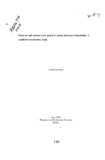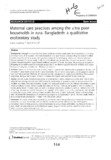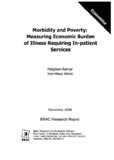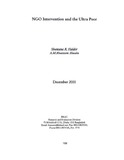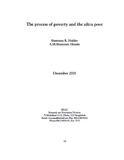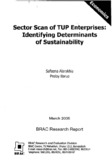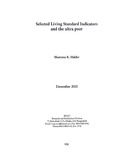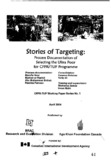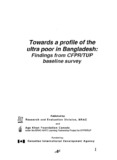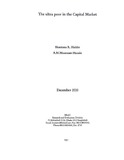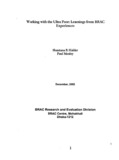Browsing by Subject "Ultra poor"
Now showing items 21-32 of 32
-
Maternal and newborn care practices among ultra poor households: a qualitative exploratory study
(BRAC Research and Evaluation Division (RED), 2008-06) -
Maternal care practices among the ultra poor households in rural Bangladesh: a qualitative exploratory study
(BRAC Research and Evaluation Division (RED), 2010)Background Although many studies have been carried out to learn about maternal care practices in rural areas and urban-slums of Bangladesh, none have focused on ultra poor women. Understanding the context in which women ... -
Morbidity and poverty measuring economic burden of illness requiring inpatient services
(BRAC Research and Evaluation Division (RED), 2006-12)Severe illnesses may have important consequences for the poor in terms of the costs of treatment they have to bear and income erosion effects of those illnesses. The resulting depletion of wealth may also transmit poverty ... -
NGO intervention and the ultra poor
(Research and Evaluation Division, Brac, 2000-12)This report mainly discusses the perceptions of the ultra poor regarding NGO membership and their future development needs if they join NGOs like BRAC. It also focuses on reasons for membership discontinuation, issues ... -
Process documentation of selecting the ultra poor for CFPR/TUP Programme
(BRAC Research and Evaluation Division (RED), 2003-07)ll1e targeting process for the CFPR/TUP programme aims to bring together diverse strands of knowledge on poverty (indigenous, local, programmatic and academic) in identifying and selecting CFPR/TUP beneficiaries (tvfatin ... -
The process of poverty and the ultra poor
(Research and Evaluation Division, Brac, 2000-12)This report focuses on the poverty process - how they become poor, the reasons for their falling into poverty. Poverty is multi-causal. On average 1.7 causes were identified by the respondents. Major causes of poverty ... -
Sector scan of TUP enterprises: identifying determinants of sustainability
(BRAC, 2005-03)A key objective of the CFPR-TUP programme to assist the ultra poor is the development of sustainable livelihoods, through the transfer of assets and skills to specially targeted ultra poor members for income generation. ... -
Selected living standard indicators and the ultra poor
(Research and Evaluation Division, Brac, 2000-12)This report aimed to give a clear picture on the nature of their vulnerability and potentiality to cope wit by analysis their non-land asset base, ownership of savings and their level of human poverty. It was estimated ... -
Stories of targeting: process documentation of selecting the ultra poor for CFPR/TUP programme
(BRAC, 2004-04)The targeting process for the CFPR/TUP (Challenging the Frontiers of Poverty Reduction - Targeting the Ultra Poor) progranune brings together diverse strands of knowledge on ·poverty (indigenous, local, progranunatic, and ... -
The ultra poor in the capital market
(Research and Evaluation Division, Brac, 2000-12)This paper looks into the issue of accessibility of the capital market for the ultra poor by analyzing the extent of borrowing, their sources and uses of loan. One-fourth had access to any capital sources, and only about ... -
Working with the ultra poor: learnings from BRAC experiences
(BRAC, 2002-12)This paper describes BRAC experiences of working with the ultra poor over the last two · decades. The ultra poor is the poorest section among the population with a few or no asset base, highly vulnerable to any shocks ...

